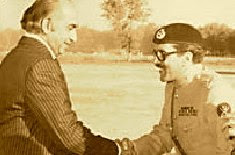The Broad spectrum Third Generation Pakistanis
Theoretically speaking, a generation spans over 30 years. So if we take the moment of the making of Pakistan as middle of the then generation, the first generation lasted till 1962, overshadowed by the opportunist element taking over the state. Second generation (1962-1992) is highlighted by 1964 and 1971 wars with India, fall of Dhaka, Bhutto’s judicial murder and General Zia’s version of Islam and Jihad. Summary of the third generation can be attaining a nuclear state status, 9/11, Musharraf’s enlightened moderation and lately the fallout of US led war on terror against Taliban. They are the ones who led Pakistan into new century. Like third generation of antibiotics, present Pakistanis are different from their predecessors in many respects. They are numerous, poorer, divided, intolerant, superstitious, frustrated, pretentious and isolated in comparison to the previous generations. I might have missed the achievements of this generation here but there is a reason for that too. First, our negatives surpass our positives, both in quantity and quality. Secondly, I am here to criticize the negative characters mentioned above. Although all of these characteristic properties can be elaborated one by one, I would like to stick to the pretentiousness and intolerance for this entry which has dominated the last few years of this fateful generation.
Many of us who attained physical maturity and economic liberty around the start of 21st century were either born or brought up in the Zia era and are undoubtedly influenced by the dictator’s national policies and his version of religion. The elders who constitute the top brass of politics, bureaucracy and military were mostly born when East and West Pakistan were together. Although shaken by 1971 split, the Pakistani society was nurturing a rightward swing even before the dictator took over, which is obvious from the religious inclusions of 1973 constitution. Zia was just an opportunist who identified the pulse of masses and benefitted from the richness of medium by adopting an Islamic reformer’s identity although we can very well appreciate that his policies of Islamization were meant for prolongation of his rule only. Eleven visionless years of rule changed the whole character of the nation and there during all those dark times, were the kids of future generations, playing in the streets, reading the recently modified texts of Jihad, seeing people being recruited for the holy war in Afghanistan, unaware of the words like democracy and power of vote, misinformed about their past and unsure of their future.
Children influenced by Zia’s philosophy of religion and state have come of voting age now and will take over the country’s leadership in a decade. But their representation at different levels has already begun to manifest. Education and sports have been badly affected by corruption while violence is at an all time high figure. A nation that was thrown into war has unfortunately owned the idea and is now ready to kill anyone in the name in which it was asked by Americans to fight Russia, the religion. Not only ready to kill, they are out there looking for someone to kill, lynching people on street, killing and burning dead bodies of pickpockets, making their videos with cell phones and uploading on youtube. Many times it is proved afterwards that the killed was not guilty at all and the reason behind the call was a financial dispute. Violence has become the general attitude of a third generation Pakistani. Although they owe it most to external forces exploiting them, yet they are themselves to be blamed too. External influences can be explained on the basis of various conspiracy theories but without getting indulged in such plots which can be easily disputed I come to the straight question, who contributed the most, to what our generation is today?
Lack of democratic culture and periods of dictatorship have kept people’s mindset uncertain. Self imposed saviors injected whatever suited them which slowly and gradually pushed the country away from the vision of its founder. Since religion has been something where people are easy to blackmail, it has been the key point in dictators’ strategies. Even if we don’t go beyond 1971, we can say that the idea of an Islamic republic was being sidelined by the idea of a theocratic state. Fact is that it is still not decided what the founders wanted to make out of this state.
Dictators are opportunists who exploit the weak points of society in order to propagate their rule. Ours have been especially lucky to have found favorable international culture too. Zia, for example, benefitted from this religious fervor of people of Pakistan and found American favors for the same too, in order to fight in Afghanistan. The third generation dictator, Musharraf, on the other hand, presented himself as a liberal person who was patted by his American bosses to fight against conservatives while he himself traded with the religious alliance for endorsement of his acts. He waged war against extremist elements while keeping coalition government intact. He played with trust of many stake holders while being a front man of US.I wonder how compatible our dictators have been with American interests that the right man (for US) takes over even before they need him.
Politicians who belong to this generation have largely been denied any rights of representation no matter how reasonable or transparent they have been. Take for example Imran Khan, the chairman of Tehreek-e-Insaf. He can be truly stated as a third generation politician with no record of corruption and family politics whatsoever but his generation did not vote for him, rather they have continued to vote in the name of tribes, clans or the mainstream (read: feudal and corrupt) politicians. Imran Khan might have been a bad politician, a confused leader or an immature policy maker, yet such a stark rejection of a sincere person speaks volumes about the mindset of masses. Where people even voted for the religious alliances and got an even worse results than the politicians, he should have been given a bit more respect.
Although I must appreciate this generation for liberating media and judiciary from various influences, a real change is still out of sight. The independence of media has, in a sense, polarized the masses, making visible divisions between the liberal and conservative forces, highlighted by loud mourning and glamorization of assassination of Governor Taseer going side by side.
Governor Taseer was murdered by his own bodyguard. Aside from discussing the delicacies of nature of punishment that should be given to someone who commits blasphemy, I would rather look upon this incident as a case study into the mindset of general public, or for that matter, third generation Pakistanis.
I hardly liked him as a politician. I would loudly say that he was not at his best when he confronted the court decision under the blasphemy law or the law itself, but that doesn’t mean that his murderer shouldn’t be showered with rose petals too. While honoring such people our generation has forgetten the legacy of our own faith. Knowing very well that the blasphemy law is dearly guarded in the Pakistan Penal Code and there hasn’t been any change in it, no one can justify a murder, neither glorification of the one who carried it out. But it only shows the mindset of the masses.
Political and regional divisions are much deeper now. Balochistan and Sind provinces are not satisfied with the center and although the sitting government comes largely from Sindh, the military establishment hasn't given away anything. Smaller political parties are encouraged to take pro-military stances and many a times media persons are not difficult to find for the same purpose.
Third generation of Pakistan shares the credit of inventing Missed Call following their ancestors’ inventions of Wheel and Zero. They have the courage to laugh at themselves as text messaging about various issues is considered a good time pass. Latest education is in fashion and Pakistan has become a big market for electronics’ utilization. They have fought inundations, earth quakes, suicide bombings and massive displacements in military operations. They lost the sports glory shared with the previous generation of winning world honors in Cricket Hockey Squash and Snooker, yet there have been many sportsmen and women of extraordinary talent. And the count goes on as we still have 12 years more for them to prove their worth. Religious issues aside, political conflicts should be resolved and a good democratic Pakistan should be handed over to next generation which will take over in 2022.
It is difficult to see a society out of international context. Unfortunately, the current has been an era of violence and wars. When superpowers of the world are engaged in wars in neighborhood, one can hardly expect peace within. Our place has become a home of spies and conspiracies. Despite all this the legacy of violence could have been erased, had there been a serious effort to take every section of the society on board while formulating political policies and educational curricula. Unfortunately this hasn’t been the case till now and this is going to persist for at least rest of the duration of this generation’s representation. So, I hope for a change towards more tolerance and homogeneity among religions and provinces and look forward to the fourth generation Pakistanis to do this job.






Dear Khalid it is wonderful insight into Pakistani Political History, and role of Generations in its making. Thanks for providing such a beautiful analysis.
ReplyDelete